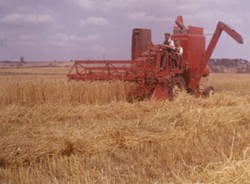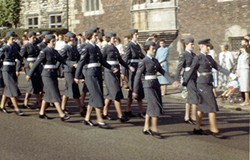How much did people earn in the 1960s?

People earned a lot less in the 1960s than they do today. Women in the 1960s earned a lot less than men. Often only half as much.
£1,000 was considered a good annual salary in the 1960s. People saw this as the dividing line between a well-paid respectable job and a poorly-paid job. £1,000 in 1965 would only be about £14,000 today. The average salary today (in 2021) is £29,600. We are much better off now. Whilst prices have gone up, earnings have increased more.
Manual occupations
Manual work was a big part of the economy in the 1960s. Rates of pay for male manual workers improved greatly in the 1960s:
- 1960 - average male manual wage - £14 per week (£728 pa)
- 1968 - average male manual wage - £22 per week (£1,144 pa)
Source: New Earnings Survey (NES) time-series of gross weekly earnings from 1938 to 2017, published by the Office for National Statistics
Women doing manual jobs were paid lot less:
- 1960 - average female manual wage - £7 per week (£364 pa)
- 1968 - average female manual wage - £11 per week (£572 pa)
Source: New Earnings Survey (NES) time-series of gross weekly earnings from 1938 to 2017, published by the Office for National Statistics
A large number of men were employed in engineering in the 1960s making cars, buses, machines and tools. The average manual wage in engineering occupations in 1960 was £14 2s 1d per week.
In 1964 the average pay of male workers in industry was £17 12s. Women lagged well behind, earning an average of only £8 16s 4d.

Farm work was poorly paid for men as well as women. In 1962 the average pay for a farm worker was just £8 15s per week.
School leavers
The school-leaving age in the 1960s was fifteen. If you left school at that age you would have no qualifications. Children did not take GCEs and CSEs until their final year at age sixteen.
You could, however, leave school at fifteen and go straight into a job.
Prudential Assurance offered jobs to sixteen year old school leavers with five GCEs including maths and English starting at £555 per annum. If you had A-levels you could get an extra £35. The job was on offer to both young men and women, although women could join without O-levels and get £525.
That was not too bad, a junior typist would only get about £8 per week at age fifteen.
You could also join the armed services at fifteen without any qualifications. Although officer cadets needed at least 5 GCEs or preferably A-levels.

Armed services
In 1966 you could join the Army between age fifteen and seventeen as an apprentice technician. Fully-qualified technicians earned up to £1,000 per annum.
The last recruits were called up to do National Service in 1960. Their basic pay was very poor at only £1 18s per week. But National Servicemen had no choice.
Pay for regular soldiers was better. In 1961 a regular a soldier would get about £7 per week and a platoon sergeant could get £16 per week. [Hansard HC Deb vol 619 col 435 (9 March 1960).]
Teachers
- 1963 - average male teacher salary - £1,244 pa
- 1968 - average male teacher salary - £1,646 pa
Teachers' pay varied enormously in the 1960s depending on qualifications and experience. Non-graduate teachers fared the worst. A newly-qualified teacher could expect to receive just £570 in 1962. This was below the average male manual wage. Teachers' pay rose to £750 after five years' experience.
Graduates did better. Their salaries started at £830 and rose to £1,040 with five years' experience.
Footballers
In the 1960s footballers earned a lot less than they do today. In 1960 a professional footballer would get a wage of between £10 and £20 per week in the playing season. In the off-season they got between £8 and £17. These figures did not include bonuses and transfer fees.
Police
In 1969 police constables earned up to £1,195 in the provinces and £1,310 in London from aged twenty-two. They also got a generous housing allowance or a rent-free police house.
Pay behind bars
Prisoners
Prisoners were paid for doing basic tasks during their time in the jail. In 1961 they could earn between 2s 6d to 6s per week. Of course, the prisoners' accommodation was included!
Prison officers
The starting salary for a prison officer in 1969 was £1,100
What were the best paid jobs?
Medicine was one of the better-paid careers in the 1960s. In 1962 the average salary of a doctor working for the NHS was £2,387. A doctor could do even better in the armed services, where pay averaged £2,750 for doctors aged twenty-five to fifty-six.
The top careers in the 1960s were in advertising, marketing or public relations. New entrants could expect to be earning £2,500 by the time they were thirty. Management consultants, organisational consultants and works study men could expect to get £2,350. If you were good at maths, computer programming or accounting this could net you £2000. [1]
Managers in some industries did even better. In 1969 a heating and air conditioning firm offered management roles with pay up to £5,000 pa. They needed to be experienced designers and estimators, as well being able to work with clients on large projects.
Politicians
In 1960 MPs were paid a salary of £1,000 per year, plus an expense allowance of £750. In 1964 their salary and expense package was increased to £3,250 of which £1,250 was for expenses and £2,000 salary.
Source www.parliament.co.uk - History of payments to MPs
What did other jobs earn?
This is a selection of jobs that were advertised in the national press in the 1960s.
- Ambulance driver/attendant in London (1966) - £14 18s to £17 10s per week
- Head cook at a residential school in London - £11 17s 10d per week
- London bus driver (1964) - £17 8s per week
- Postman in London area (1969) - £18 16s per week
- Qualified air traffic control officer (maximum) (1965) - £2,127 per annum
- Building site supervisor (Greater London Council) (1966) - £1,515 per annum plus bonus
- Shorthand typist (London) (1968) - £8 15s per week at age 15
- Personal secretary (London) (1968) - £1,458 per annum
- Building surveyor (London) (1968) - £1,500 per annum
- Technical author at Daresbury Nuclear Physics Laboratory (1968) - £1,347 - £1,565 per annum
- Trainee school leaver with 5 O' levels at Prudential Insurance (1969) - £555 per annum
- Branch manager at Barclays bank (1968) - £2,200
References
[1] 'These jobs carry the big money' by Joseph Minogue, published in The Observer, 12 September 1967, page 3
By Steven Braggs, March 2021


Comments
Also in the 1960s a single worker/ breadwinner in a family, usually the husband, in an average paying job could afford to buy a house. And if you had a bank account interest was paid on whatever you had in it. Council rates were so low one hardly noticed them.
Maybe we are better off now with more gadgets like tvs and phones being cheaper, but the essentials of living were cheaper then, especially housing.
A single breadwinner, usually a husband, in an average job could support a family and buy a modest home.
Interest was paid on any positive bank balance.
When things broke they were mended, not scrapped, items were built to last,true sustainability, not the ersatz variety we have now.
Some things were worse, some better, but on the whole simpler and more real.
The transfer of wealth from poor to rich has just accelerated since then.
We may have cheaper gadgets nowadays,
I LEFT SCHOOL IN THE MARCH OF 1969 AT THE AGE OF 15 AND STARTED AN UPHOLSTERY APPRENTICSHIP BUT I HAD TO WAIT A WHOLE TWO WEEKS FOR THE PRINCELY SUM OF £1.10 SHILLINGS,( £1.50 PENCE IN THE NEW FUNNY MONEY.). THIS WAS BECAUSE EMPLOYERS, IN THOSE DAYS, FOR SOME REASON OR OTHER COULD HOLD, WHAT WAS CALLED, A "WEEK IN HAND". WITH THAT REAL MONEY I PAID MY MUM ONE POUND. I WAS HAPPY BECAUSE, IN THOSE DAYS, TEN SHILLINGS, 50P, WAS A LOT OF MONEY. :smile
Hi Michael,
I thought that, to become an apprentice, you had to turn 16 at that time.
What kind of apprenticeship was it in your case then?
Michael (me too)
I left school at 15 started as an apprentice in the motor trade 45 hours for £2/8/6 so poor pay aidid paper rounds morning before "work " and evenings after "work" on Saturday afternoon I cleaned a butchers shop and washed his van always busy but life was simpler then
1960 started work as an apprentice in the motor trade on £2/8/6 for 45 hours was given 10/- for my weekly expenses 6 days bus fare and any entertainment ,but i also did paper rounds morning and evening also worked for a butcher on saturday afternoons life was a lot simpler